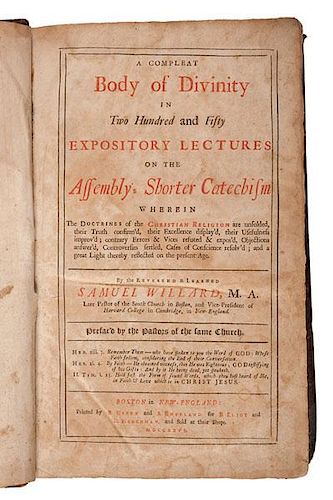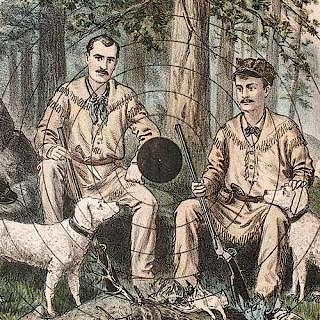Samuel Willard, "A Compleat Body of Divinity," Previously Owned by Joseph Pitkin, the Brother of William Pitkin, 2nd Colonial Governor of ConnecticutÂ
About Seller
6270 Este Ave.
Cincinnati , OH 45232
United States
With offices in Cincinnati, Cleveland and Denver, Cowan’s holds over 40 auctions each year, with annual sales exceeding $16M. We reach buyers around the globe, and take pride in our reputation for integrity, customer service and great results. A full-service house, Cowan’s Auctions specializes in Am...Read more
Two ways to bid:
- Leave a max absentee bid and the platform will bid on your behalf up to your maximum bid during the live auction.
- Bid live during the auction and your bids will be submitted real-time to the auctioneer.
Bid Increments
| Price | Bid Increment |
|---|---|
| $0 | $25 |
| $500 | $50 |
| $1,000 | $100 |
| $2,000 | $250 |
| $5,000 | $500 |
| $10,000 | $1,000 |
| $20,000 | $2,500 |
| $50,000 | $5,000 |
| $100,000 | $10,000 |
About Auction
Nov 20, 2015 - Nov 21, 2015
Cowan's Auctions dawnie@cowans.com
- Lot Description
Samuel Willard, A Compleat Body of Divinity, Previously Owned by Joseph Pitkin, the Brother of William Pitkin, 2nd Colonial Governor of Connecticut
Willard, Samuel. A Compleat Body of Divinity in Two Hundred and Fifty Expository Lectures on the Assembly's Shorter Catechism Wherein the Doctrines of the Christian Religion are unfolded, their Truth confirm'd, their Excellence display's, their Usefulness improv'd; contrary Errors & Vices refuted & expos'd, Objections answer'd, Controversies settled, Cases of Conscience resolv'd; and a great Light thereby reflected on the present Age. Boston, MA: Printed by B. Green and Kneeland for B. Eliot and D. Henchman, 1726. Oversized quarto, brown leather, six spine bands, early rubricated title in red and black, 915pp.
This copy lacks the frontis port., that apparently was not included in the earliest copies, according to notes with the Berkeley copy (courses.ischool.berkeley.edu). Pagination seems to be variable, but this copy conforms to the one cited by Evans (Early American Imprints 2828) and Streeter (675, Vol. 2). Pages 159-176 omitted in numbering. page 351 wrongly numbered as 349; page 462 wrongly numbered 562; 464 numbered 564; 463-564 repeated in numbering; 466 numbered 566; pagination after 666 begins again with 581; 856-857 wrongly numbered 854-855. We encountered at least one copy with 910 numbered 914, but this copy has the correct page number on 910.
Evans (2828) described this as “…the first folio volume, other than Laws, and the largest work up to this time printed in the United States…. Besides a catalogue of the Author’s works published in his lifetime, it contains a list of name of about five hundred subscribers. When the time, and the subject, extent, and size of the work is considered, this list is a remarkable tribute to the memory of the distinguished Author from his contemporaries; and has large genealogical value as representative of the helpful, public-spirited citizenship of the period….” (as cited in Streeter 675) Among the names included are Benjamin Franklin’s father, James, listing his occupation as ”printer,” and brother, Josiah, who ordered two books (one for Ben?). Other surnames include Adams, Alden, Hancock, Quincy, and many more.
Samuel Willard (1640-1707) was a colonial clergyman. Born in Concord, MA, he graduated from Harvard (1659) and spent most of his career at Groton (1663-1676), which was then the Massachusetts frontier. The town was destroyed in 1676 during King Philip’s War and the Willard family moved to Charlestown. When the minister of Boston’s Third Church (Old South Church) fell ill, Willard filled in as a substitute. This pastor also died, and Willard became the pastor of that church, which boasted many of Boston’s most influential citizens. Willard was known as an opponent of the witchcraft trials, and published a number of sermons on that topic. He also served as the acting President of Harvard College, although he officially held the title of Vice President, from 1701 until his death in 1707. As a sort of tribute, his sermons were collected into this massive work posthumously.
Inscriptions on front pastedown and free front endpaper identify the early owners as: Joseph Pitkin, 1726; Joseph Pitkin Junr., "The gift of his Hond. Father recd. by him Jany. 26, A.D. 1750/51." Martin Stanley; Mrs. Betsy Stanley Buckland, 1853; Mrs. Nancy M.D. Buckland, 1859; and Charles C. Buckland, 1881 (with his stamp also).
Joseph Pitkin (1696-1762) was an astute businessman and owned the iron mines that produced the iron needed for powder in the Revolutionary War. He was a colonel in the Fifth regiment in 1751, but his family members participated on behalf of the colonies. He was a justice of the peace and served in the colonial legislature for twenty years. His family included very influential residents of early CT, and many held important political offices and military appointments. He died in Hartford in 1762.Shelf wear of the binding and of the cover, especially corners. Toning of the pages. If this copy ever had gilt cover highlights, they have worn off (some copies do seem to have gilt).Condition
- Shipping Info
-
SHIPPING. At the request of the buyer, Cowan's will authorize the shipment of purchased items. Shipments usually occur within two weeks after payment has been received. Shipment is generally made via UPS Ground service. Unless buyer gives special instructions, the shipping method shall be at the sole discretion of Cowan's Auctions, Inc.. Cowan's is in no way responsible for the acts or omissions of independent handlers, packers or shippers of purchased items or for any loss, damage or delay from the packing or shipping of any property.
-
- Buyer's Premium



 EUR
EUR CAD
CAD AUD
AUD GBP
GBP MXN
MXN HKD
HKD CNY
CNY MYR
MYR SEK
SEK SGD
SGD CHF
CHF THB
THB















